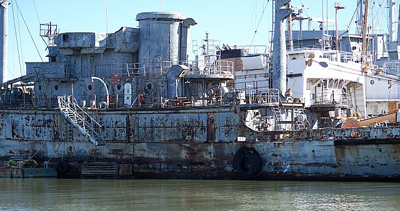Environmental groups are challenging the U.S. Maritime Administration for its failure to protect the waters of the San Francisco Bay and Delta Estuary from pollution created by a ghost fleet of toxic ships near Benicia.

Many of the ships in the ghost fleet are severely rusted and covered in peeling toxic paint that is leaching into Suisun Bay. Photo courtesy of NRDC
By Sejal Choksi
Published: February, 2008
More than 50 decommissioned and deteriorating vessels are anchored in Suisun Bay, leaching toxic paint and heavy metals into the water and sediment of the Bay. Baykeeper, Arc Ecology, and the Natural Resources Defense Council filed a lawsuit last October to force the Maritime Administration, also known as MARAD, to clean up the ships in compliance with state and federal clean water and hazardous waste laws and the National Environmental Policy Act.
Many of the ships in the ghost fleet are obsolete vessels that were decommissioned and placed in storage in Suisun Bay after World War II and the Korean War, with the idea that they could later be reactivated for wartime use. However, most of these vessels are no longer seaworthy and are slated for disposal. Suisun Bay has become a junkyard for these ships: water must be pumped from them regularly to keep them afloat, and a number have hulls that are severely rusted and covered in peeling toxic paint. A February 2007 report commissioned to assess the environmental impact of the ghost fleet revealed that the ships are a significant source of pollution. The paint on these ships is highly toxic, containing barium, cadmium, chromium, copper, lead, mercury and zinc. Already, at least 18 tons of the pollutants—which exceed hazardous waste standards—have been lost from the vessels’ exteriors. These contaminants, which have been poisoning the Bay for many years, can easily enter the food chain and may contribute to restrictions on local fish consumption.
MARAD has considered scrapping the ships in Texas, where environmental and worker safety laws may be more lenient. Towing the vessels to Texas poses many risks, however, including the potential for the ships to fall apart en route and release their toxic cargo. Another problem MARAD faces is that the Coast Guard requires hull cleaning before the ships can be moved to dismantling facilities. An underwater scraping process that MARAD has used in the past can release dangerous heavy metals and invasive species, like non-native weeds that are harmful to local marine environments.
Baykeeper and the other groups are urging that the ships be dismantled in drydocks in full compliance with local, state and federal environmental protections. In 1994, Arc Ecology and the San Francisco Redevelopment Agency collaborated on the design of a ship-scrapping program at the Hunters Point Shipyard that developed a blueprint for a cost-effective, environmentally compliant ship-dismantling program in the Bay Area and the creation of 200 new jobs. Safe and clean programs might also be established in other Bay Area yards such as Richmond and Mare Island.
Through the lawsuit, Baykeeper, Arc Ecology, and the Natural Resources Defense Council hope to ensure that the ghost fleet of Suisun Bay is cleaned up quickly and safely. Public pressure created in hearings, such as the one to be held by the State Joint Senate and Assembly Committee on Fisheries and Aquaculture in Benicia on February 7, 2008, can assist the environmental groups, state agencies and Bay Area legislators in getting the federal government to dispose quickly of the polluting vessels in an environmentally sound way.
Sejal Choksi, San Francisco Baykeeper and Program Director Sejal first joined San Francisco Baykeeper as an attorney in September 2002, spearheading San Francisco Baykeeper’s efforts to secure the nation’s first regulations to control agricultural pollution. As the San Francisco Baykeeper, she now directs all aspects of Baykeeper’s advocacy programs, pollution patrols, and legal docket.

